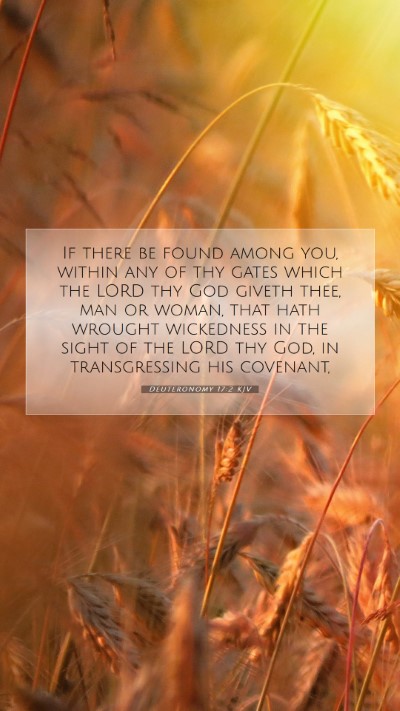Meaning and Interpretation of Deuteronomy 17:2
Deuteronomy 17:2 states: "If there be found among you, within any of your gates which the Lord thy God giveth thee, man or woman, that hath wrought wickedness in the sight of the Lord thy God, in transgressing his covenant." This verse highlights the seriousness of sin and the need for accountability within the community of God's people.
Summary and Insights from Public Domain Commentaries
-
Matthew Henry's Commentary:
Henry emphasizes the gravity of transgressions against God's covenant. He notes that the presence of sin, whether in man or woman, poses a threat to the purity of the community and the worship of God. The mention of "gates" implies a need for vigilance at every entrance to the community, ensuring that unfaithfulness does not infiltrate their lives.
-
Albert Barnes' Notes:
Barnes elaborates on the phrase "wrought wickedness," indicating that this encompasses a range of sinful behaviors and rebellion against divine law. He points out the importance of maintaining holiness and warns against tolerating sin, which could lead to national and spiritual decline. The accountability demanded of the community reflects God’s justice.
-
Adam Clarke's Commentary:
Clarke focuses on the implications of such transgressions, highlighting how they could disrupt the covenant relationship with God. He interprets this call for vigilance as a foundational principle for maintaining societal order and divine favor. Clarke's commentary underscores the communal responsibility in adhering to God's commandments.
Understanding the Verse in Context
The broader context of Deuteronomy 17 involves laws concerning justice and governance in Israel. Here, God provides guidelines for ruling authorities to ensure righteousness and moral integrity within the nation. It serves both as a warning and a guide for the community as they venture into the promised land.
Applications of Deuteronomy 17:2
This verse encourages believers to reflect on their personal and communal responsibilities to uphold God's standards. It reveals the necessity of a communal approach to sin, wherein the community supports one another in avoiding wickedness and returning to God's covenant.
Cross References
- Deuteronomy 19:15: Discusses the necessity of witnesses in establishing a matter of sin.
- Leviticus 20:10-16: Provides penalties for various forms of wickedness, highlighting the seriousness of moral law.
- 1 Corinthians 5:6-7: Addresses the impact of sin within the church body and the need for purification.
Theological Implications
The theology surrounding Deuteronomy 17:2 focuses on God's holiness and the expectation of His people to mirror that holiness in their conduct. This verse serves as a reminder that God's covenant is not merely a spiritual agreement but a serious commitment that entails consequences for disobedience. It reflects the broader biblical themes of sin, accountability, and community purity.
Conclusion
In summary, Deuteronomy 17:2 stresses the seriousness of sin and the community's role in upholding righteousness. The insights offered by Matthew Henry, Albert Barnes, and Adam Clarke illuminate our understanding of this scripture, enhancing our Bible verse meanings, interpretations, and explanations. Engaging with such texts provides valuable Bible study insights that are crucial for personal growth and communal accountability in faith.
Further Study Resources
For those interested in deepening their understanding of this and similar passages, consider exploring various bible study tools and resources available online. Engaging with bible study guides, participating in bible study groups, and utilizing bible study materials can enrich your study experience.


